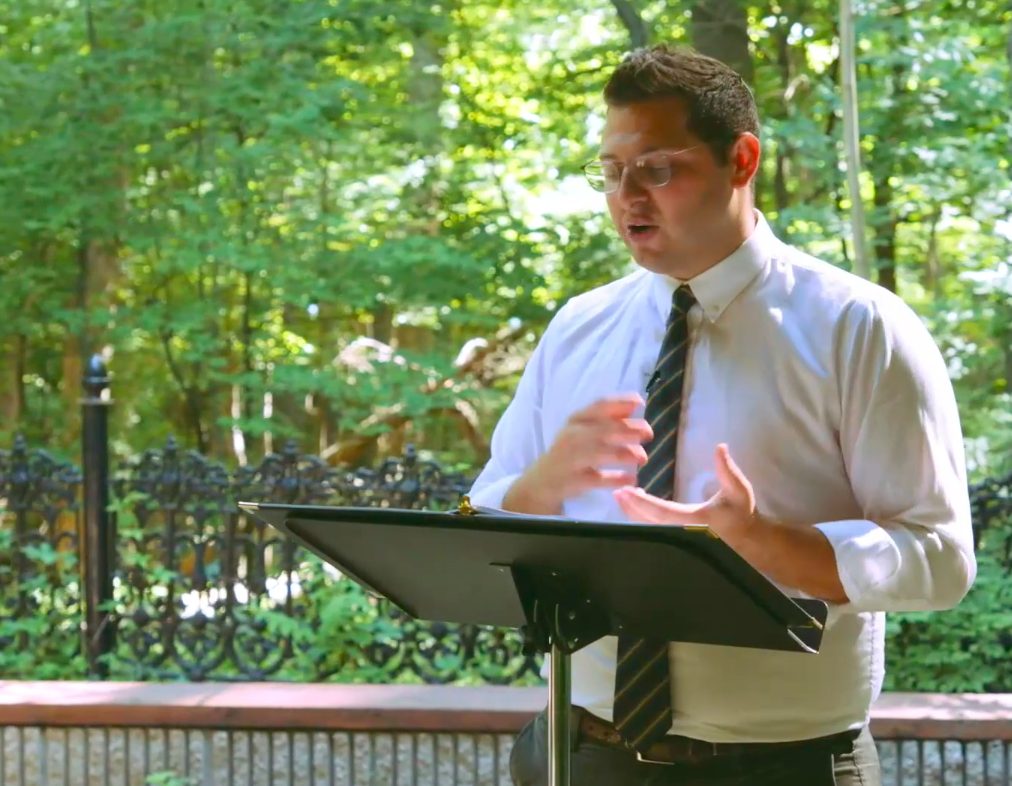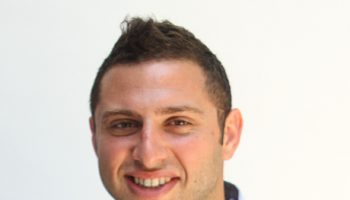
Climate change, the pandemic and systemic racism intersected in Rabbi Nate DeGroot’s lecture, “Tikkun Adam(ah): A Jewish Response to a World in Upheaval,” on Tuesday, June 30, on CHQ Assembly’s Video Platform. DeGroot was the first speaker for this season’s Interfaith Lecture Series, and for Week One — “Faith to Save the Earth” — after the Monday lecture was postponed due to technical difficulties.
DeGroot opened with how easy it is to misunderstand one person’s effect on the environment.
“At the end of the day, I can’t break the forest or raze a mountain,” DeGroot said.
But DeGroot cited the Arctic’s temperature rising to 100 degrees Fahrenheit a week prior, and that 19 of the last 20 years have been the hottest on record as reasons that people need to understand their effect on nature.
“And so it is — clearly, I believe — past time to rethink our relationship to nature,” DeGroot said.
DeGroot serves as associate director and the spiritual and program director of Hazon Detroit, a city branch within an international Jewish environmental organization that encourages the Jewish community to reconnect to nature through its initiatives. In Hazon Detroit’s case, DeGroot said that it also serves a supporting role for the city’s Black and Native communities.
During the Q-and-A, DeGroot said these communities have been underserved in the past and present due to white flight, including the Jewish community leaving for the suburbs after the 1967 Detroit rebellion. As a result, Hazon is reconnecting with those communities left behind, which have created self-sufficient networks like community gardens.
DeGroot said that with a live audience, he often asks questions aloud for people to answer in real time. He did it anyway and asked his audience to answer to their screen as if they were watching “Jeopardy” while he called on imaginary audience members.
“What is the Hebrew word for nature?”
Whoever answered got it right on the first try — “teva.” The last two questions were harder to answer for his imaginary live audience.
“Teva” was first recorded in Jewish thought in the 12th century. It is never used in the Old Testament while describing creation, the Garden of Eden, or Noah’s Ark, nor used in the Psalms.
Jewish texts had no word for nature until then, because at the center of Judaism, “there was no distinction between God and the natural world,” DeGroot said.
No word could contain the eternal, but Judaism revolves around “intimate relationships with nature,” its whims and its weather patterns.
Agricultural seasons frame Jewish holidays. The setting of the sun until only three stars are in the sky marks the end of Shabbat, or Sabbath. Early prayers for rain were paired with dancing and holding willow branches and palm fronds.
Nature was only a “garb” in which God was dressed.
“(By this definition) how we treat nature is a direct reflection of how we treat God, and perhaps vice versa,” DeGroot said. “If God and nature cannot be separated, then every toxic fume that gets puffed into the air is filling God’s lungs with smoke.”
DeGroot quoted the fifth book of the Torah as a warning of what happens when people deny connection between faith and nature.
“If we follow the Commandments, then Deuteronomy says ‘The rains will fall in their season, our harvests will be abundant, our cattle will have ample food to eat and we shall be sated,’” DeGroot said. “But if we stray, and worship idols, and profane and forget what is most sacred in this world, God’s anger will flare up against us. Until the skies above our heads turn to copper, and the earth below our feet becomes iron, the rain of our land will be dust and sand will drop on us from the sky until we are wiped out.”
DeGroot clarified that this was not a “prescriptive” solution from God, but a natural outcome of people’s actions — or lack thereof.
“This is not God punishing us for straying; rather, these lines are descriptive,” DeGroot said. “The natural result of our own careless and callous actions — which, by the way, much like warnings from the latest U.N. Climate Report — teach us that when we neglect the sacred, the sacred will just as quickly neglect us.”
Linking science to the sacred, DeGroot suggested there is a new way to take God for granted.
“When we live outside the right relationship with the natural world, and puff toxic fumes and spew deadly toxins and etch the Earth with oil, we curse ourselves,” DeGroot said. “Is this not what it means to take God’s name in vain in a 21st-century context? And when we hurt nature, the Deuteronomy text makes clear that not only are we hurting God, but we are also hurting ourselves.”
DeGroot called for a Tikkun Adamah. Tikkun is a healing, while Adamah refers to “the dust of the earth” from which God formed Adam.
“Today we are in need of what in Hebrew is called a Tikkun, a kind of mending, fixing, repairing,” DeGroot said. “Tikkun Adam, a healing of the self, and Tikkun Adamah, a healing of earth.”
DeGroot said climate change has compounded recent events like the coronavirus pandemic and “other pandemics” of systemic racism, extractive capitalism and white supremacy.
COVID-19 specifically proved to DeGroot that the world is interconnected, and as a result, demands people care for each other.
“As a resident of Detroit, one thing was clear: that however bad COVID was going to get generally, Detroit would be hit harder than most because the largest majority of Detroit — the largest majority-Black city in the country, like the residents of many other industrial rust belt cities and urban communities — have seen their neighborhoods systematically divested from for well over 50 years,” DeGroot said.
He noted the breakdown of basic infrastructure, systems and support networks coinciding with white flight in the ‘60s and ‘70s, which left the remaining communities with little support.
“(This) means residents now are left severely lacking in what many of us probably assume are basic services, and (they) are therefore far more susceptible to COVID,” DeGroot said.
Finding healthy food and going to the hospital is more difficult due to the lack of public transportation. Water shut off in thousands of homes prevents families from being able to practice good hygiene or stay hydrated. Those who become sick might fear going to the hospital because they can’t afford treatment or are turned away when they most need care.
Detroit also has had the worst broadband connection of all cities in the United States since 2015, according to the FCC. Detroit public school students suffer from the school system’s lack of funding, so continuing education without the necessary technology proves “basically impossible,” DeGroot said, while more well-off students continue unphased.
Detroit also has the highest rates of asthma in the state of Michigan.
“This is just one example of the many underlying health conditions caused by environmental racism that generations of Detroiters face,” DeGroot said. “Detroit has the highest Black population of any city in the U.S., (and) suffered from the third-most coronavirus deaths in this country.”
One pastor who Hazon Detroit works with has lost 14 family members to the coronavirus.
“None of this is by accident,” DeGroot said. “But rather, this is what happens when people put profit over populace.”
DeGroot told the story of the Tower of Babel, the second example in Jewish texts where humans challenged the divine. According to midrash writings (or narrative interpretations of the Torah and the books of prophets) as the tower to reach God grew higher, it took a year for someone to climb up to add a precious brick to the top. When someone would fall to their death by accident, “bricks became more precious than people” and those below mourned the ruined bricks instead of the person who carried it.
“It is not a sin to build,” DeGroot said. “It is a sin to build towards a perverted cause, to build towards any vision other than the holiness of life and the celebration of the sacred.”
DeGroot likened current affairs with the sin of Babel.
“Our country’s reality of this lived midrash began with genocide and the forced misplacement of Native people, and was built by the hands and ingenuity of Black people taken from their homeland and brought to these shores to be brutally exploited as property,” he said. “… While the circumstances have changed over the years, the structural underpinnings of our society have not.”
DeGroot quoted an opinion article by Tamara Toles O’Laughlin, the North America Director of 350.org which supports anti-fossil fuel organizers and campaigners in the United States and Canada, titled “If you care about the planet, you must dismantle white supremacy.”
She wrote that communities getting hit the hardest by COVID-19 and climate change are also affected by over-policing, incarceration and state-sanctioned violence, which includes “sacrifice zones” of neighborhoods near toxic factories and fumes that have increased multi-generational rates of asthma and other health conditions in these communities.
“This adds a grim familiarity to the death-throe pleas of ‘I can’t breathe,’ made by both George Floyd and Eric Garner while they were choked to death by police in Minneapolis and Staten Island, respectively,” O’Laughlin wrote. “… Are you willing to hold accountable all of the systems built off white supremacy — from the fossil fuel industry to racist policing to the prison industrial complex — in defense of the planet? Are you willing to interrogate your complicity in the systems built on white supremacy and commit to dismantling it?”
DeGroot likened this to the exodus of the formerly enslaved Israelites from Pharaoh’s Egypt.
“According to the Midrash, the Israelites’ true and lasting liberation comes not only from the physical leaving of Egypt, but from the Israelites’ emphatic refusal to no longer worship the false idols of Egyptian rule,” DeGroot said.
DeGroot ended with one last call for Tikkun Adam and Tikkun Adamah — the healing of the soul of the people as well as the soil — to soften hearts enough to enact physical change; end false gods of extraction; and follow leaders of the new movement when the world reaches the other side of this moment.
“Nothing less will do,” DeGroot said.




